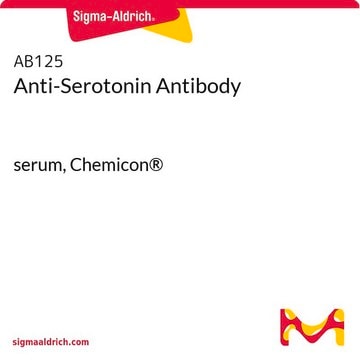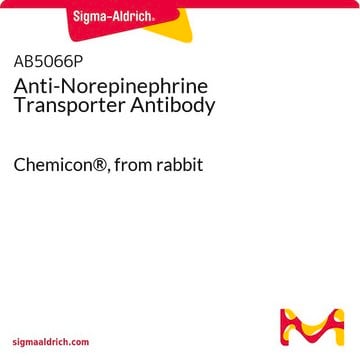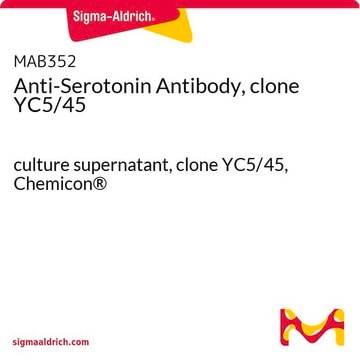AB120
Anti-Norepinephrine Antibody
serum, Chemicon®
Synonym(s):
Arterenol, Noradrenaline
Sign Into View Organizational & Contract Pricing
All Photos(1)
About This Item
UNSPSC Code:
12352203
eCl@ss:
32160702
NACRES:
NA.41
Recommended Products
biological source
rabbit
Quality Level
antibody form
serum
antibody product type
primary antibodies
clone
polyclonal
species reactivity
human, rat
manufacturer/tradename
Chemicon®
technique(s)
immunohistochemistry: suitable
shipped in
dry ice
target post-translational modification
unmodified
Gene Information
human ... SLC6A2(6530)
General description
The chemical compound norepinephrine (NC(8)O(3)H(11), also known as noradrenaline, is a catecholamine that functions as both a neurotransmitter and a hormone. It is released from the adrenal glands and also by certain neurons. It affects parts of the human brain where attention and impulsivity are controlled. This compound affects the fight-or-flight response, activating the sympathetic nervous system to directly increase heart rate, release energy from fat and increase muscle readiness.
The host of physiological changes activated by a stressful event are unleashed in part by activation of a nucleus in the brain stem called the locus ceruleus. This nucleus is the origin of most norepinephrine pathways in the brain. Neurons using norepinephrine as their neurotransmitter project bilaterally from the locus ceruleus along distinct pathways to the cerebral cortex, limbic system, and the spinal cord, among other projections.
The host of physiological changes activated by a stressful event are unleashed in part by activation of a nucleus in the brain stem called the locus ceruleus. This nucleus is the origin of most norepinephrine pathways in the brain. Neurons using norepinephrine as their neurotransmitter project bilaterally from the locus ceruleus along distinct pathways to the cerebral cortex, limbic system, and the spinal cord, among other projections.
Specificity
Noradrenaline: reactive with noradrenaline reacted with glutaraldehyde; glutaraldehyde required in fixation for reactivity; reactivity with free noradrenaline is very poor.
The cross-reactivities were determined using either ELISA or RIA techniques, at concentration/unconjugated or conjugated amino acid concentration at half displacement.
Compound Cross-reactivity
Noradrenaline-G-BSA 1.0
Octopamine-G-BSA 0.032
Dopamine-G-BSA 0.016
Adrenaline-G-BSA 0.006
Noradrenaline 0.0002
L-Dopa-G-BSA 0.0002
p-Tryamine-G-BSA 0.0002
*The antisera was also tested for specificity using the free-floating PAP technique on rat locus coeruleus.
Abbreviations:
(BSA)= Bovine serum albumin
G)= Glutaraldehyde
The cross-reactivities were determined using either ELISA or RIA techniques, at concentration/unconjugated or conjugated amino acid concentration at half displacement.
Compound Cross-reactivity
Noradrenaline-G-BSA 1.0
Octopamine-G-BSA 0.032
Dopamine-G-BSA 0.016
Adrenaline-G-BSA 0.006
Noradrenaline 0.0002
L-Dopa-G-BSA 0.0002
p-Tryamine-G-BSA 0.0002
*The antisera was also tested for specificity using the free-floating PAP technique on rat locus coeruleus.
Abbreviations:
(BSA)= Bovine serum albumin
G)= Glutaraldehyde
Immunogen
Noradrenaline-glutaraldehyde-BSA
Application
Anti-Norepinephrine Antibody is an antibody against Norepinephrine for use in IH.
Immunohistochemistry: 1:200-1:500 with enhanced detection. Glutaraldehyde fixation required for reactivity. Lightly fixed 4% PFA .2-5% glutaraldehyde fixed tissue works well; permeabilization with 0.1-.2% triton X-100 in block ONLY. Dilute antibody solutions in simple buffers without excess proteins or detergents.
Optimal working dilutions must be determined by the end user.
Optimal working dilutions must be determined by the end user.
Research Category
Neuroscience
Neuroscience
Research Sub Category
Hormones & Receptors
Hormones & Receptors
Physical form
Liquid rabbit antiserum with 0.05% sodium azide.
Storage and Stability
Maintain at -20°C in undiluted aliquots for up to 6 months after date of receipt. Avoid repeated freeze/thaw cycles.
Legal Information
CHEMICON is a registered trademark of Merck KGaA, Darmstadt, Germany
Disclaimer
Unless otherwise stated in our catalog or other company documentation accompanying the product(s), our products are intended for research use only and are not to be used for any other purpose, which includes but is not limited to, unauthorized commercial uses, in vitro diagnostic uses, ex vivo or in vivo therapeutic uses or any type of consumption or application to humans or animals.
Not finding the right product?
Try our Product Selector Tool.
Storage Class Code
12 - Non Combustible Liquids
WGK
WGK 2
Flash Point(F)
Not applicable
Flash Point(C)
Not applicable
Certificates of Analysis (COA)
Search for Certificates of Analysis (COA) by entering the products Lot/Batch Number. Lot and Batch Numbers can be found on a product’s label following the words ‘Lot’ or ‘Batch’.
Already Own This Product?
Find documentation for the products that you have recently purchased in the Document Library.
Matti Mauramo et al.
PloS one, 9(7), e103527-e103527 (2014-07-30)
Human leukocyte antigens (HLA) are crucial components of host defense against microbial challenge but the associations of HLA types with oral infectious diseases have not been studied in detail. This prospective cross-sectional study examined associations of HLA-A, -B and -DRB1
Jean-Marie Tiercy et al.
Immunogenetics, 56(4), 301-303 (2004-06-29)
Meiotic recombinations within the HLA-DR/DQ subregion are seldomly observed. However the high number of unusual DRB1-DQB1 allelic combinations underline the importance of crossover in shaping the class II haplotypic diversity. We present here the first report of a DQA1-DQB1 recombination
J M Tiercy et al.
Bone marrow transplantation, 26(4), 437-441 (2000-09-12)
Patients transplanted with marrow from an HLA-ABDR serologically matched unrelated donor suffer from more post-transplant complications than those who are transplanted with marrow from an HLA-identical sibling. This is most likely due to either HLA-ABDR incompatibilities not resolved by standard
Role of key aromatic residues in the ligand-binding domain of alpha7 nicotinic receptors in the agonist action of beta-amyloid.
Tong, M; Arora, K; White, MM; Nichols, RA
The Journal of Biological Chemistry null
Yasmine Cantaut-Belarif et al.
eLife, 9 (2020-10-14)
The cerebrospinal fluid (CSF) contains an extracellular thread conserved in vertebrates, the Reissner fiber, which controls body axis morphogenesis in the zebrafish embryo. Yet, the signaling cascade originating from this fiber to ensure body axis straightening is not understood. Here
Our team of scientists has experience in all areas of research including Life Science, Material Science, Chemical Synthesis, Chromatography, Analytical and many others.
Contact Technical Service








